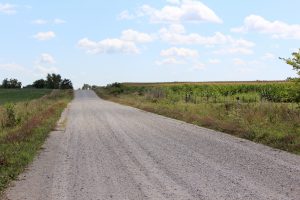InTrans / Oct 15, 2020
Granular Roads Asset Management System (GRAMS) tool can aid agencies

Gravel roads account for more than 60 percent of the roads managed by Iowa counties. However, until now, there haven’t been readily available tools to help agencies evaluate granular material costs versus field performance.
To help agencies evaluate and optimize their operational strategies for their granular material purchases and use, researchers recently created the Granular Roads Asset Management System (GRAMS) spreadsheet tool.
Local agencies can use the tool to estimate annual gravel loss on a system-wide basis. The tool provides a range of options for varying budget conditions to estimate aggregate requirements under different roadway levels of service.
“Local agencies have traditionally used their previous experience and quick visual inspections to estimate their annual aggregate needs,” said Bora Cetin, who was the principal investigator on the GRAMS project. “We hope this tool will significantly help local agencies to better maintain and manage their granular roads, and further help them to defend their estimated materials needs and budget requests.”
The required input values are county name; roadway system properties such as length, width, and condition; and unit costs such as materials and hauling. There are additional optional input values, including material properties, desired level of service, and a range of maintenance options. The tool is sensitive to the roadway drainage condition, so caution is advised with that particular input parameter.
The tool was developed largely based on survey responses, empirical opinion, and a limited amount of historical performance data. To continue to improve the tool, researchers recommend that counties collect more data on their granular roadways and created a roadway condition report as part of its research project to assist operators in that effort.
The spreadsheet tool, user manual, and full report are available here. In addition, a tutorial video on using the tool is available here.
Cetin, who is now an assistant professor at Michigan State University, is continuing his work with the IHRB to lessen wear and tear on granular roadways. One project is looking at using a material that can make soils water repellent, and another is looking at using new machinery to conduct strength tests on soil.
